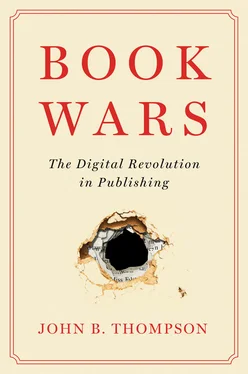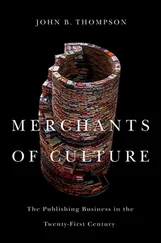514 501
515 502
516 503
517 504
518 505
519 506
520 507
521 508
522 509
523 510
524 511
Book Wars
The Digital Revolution in Publishing
John B. Thompson
polity
Copyright © John B. Thompson 2021
The right of John B. Thompson to be identified as Author of this Work has been asserted in accordance with the UK Copyright, Designs and Patents Act 1988.
First published in 2021 by Polity Press
Polity Press
65 Bridge Street
Cambridge CB2 1UR, UK
Polity Press
101 Station Landing
Suite 300
Medford, MA 02155, USA
All rights reserved. Except for the quotation of short passages for the purpose of criticism and review, no part of this publication may be reproduced, stored in a retrieval system or transmitted, in any form or by any means, electronic, mechanical, photocopying, recording or otherwise, without the prior permission of the publisher.
ISBN-13: 978-1-5095-4678-7
A catalogue record for this book is available from the British Library.
by Fakenham Prepress Solutions, Fakenham, Norfolk NR21 8NL
The publisher has used its best endeavours to ensure that the URLs for external websites referred to in this book are correct and active at the time of going to press. However, the publisher has no responsibility for the websites and can make no guarantee that a site will remain live or that the content is or will remain appropriate.
Every effort has been made to trace all copyright holders, but if any have been overlooked the publisher will be pleased to include any necessary credits in any subsequent reprint or edition.
For further information on Polity, visit our website: politybooks.com
During the last few decades, we have been living through a technological revolution that is as radical and far-reaching as any that came before in the long history of the human species. Among other things, this new revolution is transforming our information and communication environment and disrupting many of the industries that played a central role in shaping this environment for most of the twentieth century and before. The traditional media industries – newspapers, radio, television, music, cinema – have all been hurled into a whirlpool of change as old analogue technologies were pushed aside by new technologies based on the digital codification and transmission of symbolic content. Many of the media institutions that were key players in the analogue age have found themselves threatened by the digital transition, their revenues collapsing and their once-dominant positions undermined, while powerful new players have emerged and begun to reshape the contours of our information space. Today we live in a world which, in terms of the forms and channels of information and communication, is fundamentally different from the world that existed just half a century ago.
The book publishing industry is no exception – it too has been caught up in the turmoil brought about by the digital revolution. And, in some ways, there is more at stake here than with other media industries: not only is the book publishing industry the oldest of the media industries, it is also an industry that has played a pivotal role in the shaping of modern culture, from the scientific revolution in early modern Europe to the profusion of literatures and forms of knowledge that have become such an important part of our lives and societies today. So what happens when the oldest of our media industries collides with the great technological revolution of our time? What happens when a media industry that has been with us for more than 500 years and is deeply embedded in our history and culture finds itself confronted by, and threatened by, a new set of technologies that are radically different from those that have underpinned its practices and business models for centuries? If you were working in the book publishing industry during the first decade of the twenty-first century, you wouldn’t have had to look far to find reasons to feel anxious about your future: the music industry was in freefall, the newspaper industry was experiencing a sharp decline in revenue and some of the big tech companies were becoming seriously interested in the digitization of books. Why wouldn’t the book industry be swept up in the maelstrom unleashed by the digital revolution? No hard-headed manager or disinterested analyst would have been sanguine about the chances of the book publishing industry surviving its encounter with the digital revolution unscathed.
But what form would the digital disruption of the book publishing industry assume, exactly? Would the industry undergo a root-and-branch transformation like the music industry, where physical formats morphed into digital downloads and the major record labels that had controlled the production and distribution of music experienced a dramatic collapse in revenues? Would ebooks take off and become the new medium of choice for readers, consigning the print-on-paper book to the dustbin of history? Would bookshops disappear and publishers be disintermediated by a technological revolution that would enable readers and writers to communicate directly via the internet, unhindered by the traditional gatekeepers of the book publishing industry? In the early 2000s, all of these possibilities – and more – were being seriously contemplated, both by senior managers within the industry and by the many commentators and consultants who were happy to offer their views on the future of an industry that seemed to be on the cusp of disruption.
As the years went by, this remarkable encounter between the oldest of our media industries and the great technological revolution of our time gradually took shape, producing outcomes that very few commentators had anticipated. It is not simply that the commentators were wrong – though, in many cases, they were, and wildly so. It is that their ways of thinking about what happens when technologies disrupt established industries were based far too much on the analysis of the technologies themselves and on a belief – usually implicit, rarely examined – that new technologies, by virtue of their intrinsic and advantageous features, would prevail eventually. What seldom featured in these accounts was any real awareness of how the development of new technologies, and their adoption or non-adoption as the case may be, are always embedded in an array of pre-existing social institutions, practices and preferences, and are always part of a dynamic social process in which individuals and organizations are pursuing their own interests and aims, seeking to improve their own positions and out-manoeuvre others in a competitive, and at times ruthless, struggle. In short, what most commentators lacked was any real understanding of the forces that were shaping the particular social space or ‘field’ within which these technologies were being developed and deployed. They focused on the technologies themselves, as if technologies were a deus ex machina that would sweep all before it, without taking account of the complex social processes in which these technologies were embedded and of which they were part. Of course, this abstraction from social processes made the commentators’ task a whole lot easier: the social world is a messy place and it’s much easier to predict the future if you ignore the messiness of the present. But it doesn’t make your predictions more accurate, and you don’t improve our understanding of technological change by discounting the social, economic and political factors that shape the contexts within which technologies exist.
This book is based on the assumption that we can understand the impact of the digital revolution on an industry like book publishing – and indeed any industry, media or otherwise – only by immersing ourselves in the messiness of the social world and understanding how technologies are developed and deployed, how they are taken up or passed over, by individuals and organizations who are situated in certain contexts, guided by certain preferences and pursuing certain ends. Technologies never produce effects ex nihilo , but always in relation to the individuals and organizations who decide to invest time and energy and resources in them as a way of pursuing their interests and aims (whatever they might be). The messiness of the social world is not a distraction from technology’s path but is the path itself, for it is the interaction between the affordances of new technologies – that is, what these technologies enable or make possible – and the messiness of the social world that determines what impact new technologies will have and the extent to which, if at all, they will disrupt existing institutions and practices.
Читать дальше












